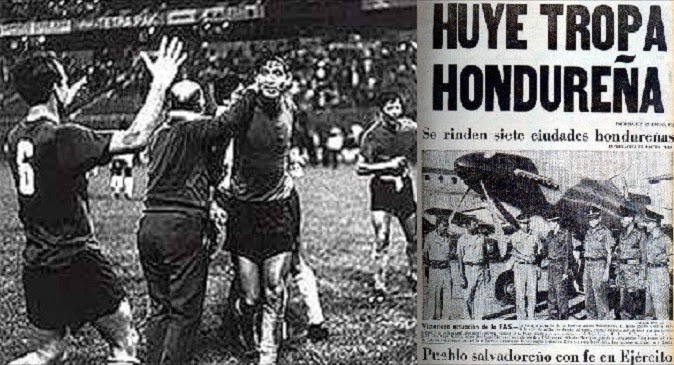
The 1969 play-off match between El Salvador and Honduras (two teams that are not only neighbors but rivals) was filled with anticipation and aggression. This playoff match would decide which nation would be attending the world cup, and which would be staying home. El Salvador and Honduras had each won one match which forced a third, and final, play-off match.1 In the prior matches, fights had broken out between fans in the street and in the stands during the game. But on the day of the final play-off, a much more significant event would take place. The game was scheduled in Mexico City: a third-party country with no bias toward either team. The day of the playoff, El Salvador dissolved all diplomatic ties with Honduras right before the match.
In the first game between the two nations, Honduras won the match 1-0 in its own capital. Some Hondurans stayed outside of the hotel that the El Salvador team had been staying at and threw rocks, set off car alarms and threw firecrackers.2 The 2nd match took place in San Salvador, where the home fans would watch their team win by a commanding score of 3-0. Before the 2nd match took place, the Honduran National team had a security force with them at all times. During the game the security at the stadium was extremely tight with lots of alcohol and weapons confiscated as a security precaution. As the Honduran national anthem played, the home team and fans were extremely disrespectful towards the players and their country. This caused some whiplash for El Salvadorians living in Honduras as their businesses were boycotted and vandalized.3 Leading up to the series of matches, the two nations were in a deep dispute over land reform and immigration. El Salvador was sending its poorest citizens into Honduras so the wealthy could maintain their land.4 El Salvador had a much bigger population than Honduras. Honduras had a population of about 2 million, where as El Salvador had a population of almost 4 million.5

However, they had a significantly smaller amount of land which forced more than 275,000 El Salvadorians to flee into Honduras, causing poverty and crime.6 Honduras accused the El Salvadorians of stealing jobs from the native people of Honduras. But after the 2nd games violence, El Salvador accused Honduras of staying silent while El Salvadorians living in Honduras were raped, murdered, robbed, and oppressed. Neither side was willing to negotiate to the smallest extent, which led to tensions building up even more. In the final match between the two teams, El Salvador won the game in overtime with the score of three to two.7 This caused numerous Salvadorians to be killed in Honduras.8
On July 14th, 1969, almost 3 weeks after the final playoff game, El Salvador bombed targets inside of Honduras. They crippled Honduras by attacking their main airport which left them unable to react to the attack at optimal speed.9 El Salvador then attacked from the ground by marching through the two main roads that connect the countries. Only one day later, the El Salvadorian army had pushed Honduras back over 8 kilometers. The El Salvadorian Army continued to make steady progress. They were nearing the capital city of Honduras, Tegucigalpa, when Honduras finally pushed back. The Honduran Air Force attacked Llopango base. The bombers eventually progressed to Acajutla port, which was important because it was home to El Salvadorian oil refineries. Later that evening huge smoke clouds covered the coast as the the oil refineries were bombed.10
Fearing that the nearing El Salvadorian army would overtake the capital, Honduras called the Organization of American States for help. The Organization of American States (OAS) had an urgent meeting on the evening of July 15th and called for El Salvador to withdraw its troops from Honduras ensuring that its people living in Honduras would not be harmed.11 El Salvador refused, demanding reparations be paid to them and their citizens. El Salvador attempted to further the attack the capital city, but they were unable to proceed with the attack. The previous strike on their oil refineries had destroyed their line of fuels and supplies and they no longer had supplies arriving every other day. Somoza Debayle, the dictator of Nicaragua was also helping Hondurans by arming them with weapons and providing ammunition. The OAS worked night and day in order to provide a cease-fire that would please both parties. Finally, on the night of July 18th, a ceasefire was arranged and became effective two days later.12
Although the cease-fire had been called, El Salvador refused to leave Honduras. They stayed until they were threatened by the OAS with economic sanctions against them. The El Salvador government finally withdrew troops on August 2, 1969. The aftermath of the 100-hour war was anything but slim. More than 2000 civilians were killed, with more than 100,000 immigrants displaced.13 Although they were no longer at war with each other, these two nations peace treaty only came into force on December 10, 1980.14
- Paul Joseph, The SAGE Encyclopedia of War: Social Science Perspectives, 2017 s.v . “Soccer War.” ↵
- Hatcher Graham, Salem Press Encyclopedia, 2013, s.v “Soccer War.” ↵
- Steve C. Ropp, 1982, “The War of the Dispossessed: Honduras and El Salvador, 1969. Thomas P. Anderson.” The Hispanic American Historical Review, no. 2: 296. JSTOR Journals, EBSCOhost (accessed February 5, 2018). ↵
- Richter, Ernesto, John Beverly, Bob Dash, and Irma Fernandez Dash. “Social Classes, Accumulation, and the Crisis of “Overpopulation” in El Salvador” Latin American Perspectives, 7, 1980 ↵
- Ernesto Richter, John Beverly, Bob Dash, and Irma Fernandez Dash. “Social Classes, Accumulation, and the Crisis of “Overpopulation” in El Salvador”, Latin American Perspectives, 7, 1980. ↵
- Charles Clements, Witness to War: an American Doctor in El Salvador (New York; Bantam Book, 1984). ↵
- Hatcher Graham, Salem Press Encyclopedia, 2013, s.v “Soccer War.” ↵
- Charles Clements, Witness to War: an American Doctor in El Salvador (New York; Bantam Book, 1984). ↵
- Charles Clements, Witness to War: an American Doctor in El Salvador (New York; Bantam Book, 1984). ↵
- Charles Clements, Witness to War: an American Doctor in El Salvador (New York; Bantam Book, 1984). ↵
- Charles Clements, Witness to War: an American Doctor in El Salvador (New York; Bantam Book, 1984). ↵
- Charles Clements, Witness to War: an American Doctor in El Salvador (New York; Bantam Book, 1984). ↵
- Charles, Clements, Witness to War: an American Doctor in El Salvador (New York; Bantam Book, 1984). ↵
- Charles Clements, Witness to War: an American Doctor in El Salvador (New York; Bantam Book, 1984); and United Nations -Treaties Series, General Peace Treaty Between the Republics of El Salvador and Honduras, 1980, https://peacemaker.un.org/sites/peacemaker.un.org/files/HN-SV_801030_GeneralTreatyOfPeaceElSalvadorHonduras.pdf. ↵



106 comments
Haley Ticas
This was a very interesting and intriguing article to read. I am half Salvadoran and have never heard of this event. I knew that the two countries were rivals and tended to clash but didn’t know the background of why. This was an event where emotions were definitely heightened as passion from the different teams supporters translated to politics as well. It is interesting and unfortunate to see how sports affect behavior, relationships between individuals, and politics.
Juan Asfura
This is a very famous story back in Honduras. People laugh that a soccer match actually was the main reason a battle between Honduras and El Salvador actually happen. As a Honduran I can say with certainty that soccer is the way all of us unify, the national team of Honduras is the pride of the country and the sport we follow the most. There are always fights between the teams but in that game it became more personal and its the only time we had to use our planes to attack another country or basically the only battle we had after our independence.
Carlos Apodaca
The title of this article really caught my attention and was the main reason why i clicked on it. Its incredible to see the outbreak between two countries affected sports. Ive never read about political conflict or tensions between countries be such an impact in sports like this situation. Reminds me of the tensions that the United States hockey team had with the Soviet Union team during the olympics in the past.
Raul Colunga
Great choice of topic, I had never heard about this conflict before. I have definitely seen soccer games that have gone south and fans turn violent against other fans and teams. But with tensions already existing between the two countries this game was the match to the kindling that turned into an a war. It is a shame to see that to this day El Salvador is still gripped by violence.
Stephen Talik
It really is interesting to see how sports can be the heart and soul of a country, as well as the potential of the game to reflect the climate of the country at the time. There are other similar examples where sports wield enormous influence, such as ping pong in China, soccer (or futbol) in South America, cricket in India and Australia, and Rugby in New Zealand. The zeitgeist of the time is often reflected in the environment around it, as both Honduras and El Salvador found out to their dismay.
Kacey Diaz
I think the title of this article really fits. This wasn’t just about a soccer game, it was a conflict between two neighboring countries where tensions were high. The high tensions caused massive outbreaks that cost thousands of lives from both countries. It may have started with a soccer game but it quickly escalated to something more extreme.
Lulu Avitua-Uviedo
Very interesting article, information I was very unaware about. It seems so astonishing to me, that a game becomes so political but at the same time, not so much. Why? Because it seems with everything there is a connection to politics.” When a game was just a game” seems such a unlikely scenario.
Maria Rivera
This article was enlightening for me; I never really paid much thought as to how sports can be influenced by political climate. I have heard of extreme situations stemming from sports events. I’ve heard of fights breaking out, and some fights even resulting in death, but not to this extent. Two thousand civilians were killed, that is unbelievable. Sports are supposed to be entertainment; they are supposed to bring people from all over the world together. I supposed the game was too much strain on the already existing tension between the two countries. The game was truly lost by both nations.
Kendall Guajardo
I was shocked when I read this article. Most of this information is very new to me and I found it to be greatly expansive on how civilized societies can cause unrest because of competition. I read an article that compared war and football which was a great leap from what I would have imagined war could have been compared to. I can see the parallels in this article pulling from themes I have previously read on the barbaric actions in competitive football and war. Only this time sports caused political unrest and social upheaval.
Aracely Beltran
This article is a perfect example of how people tend to take things too seriously. It is such a tragedy that people had to die over something so insignificant. The population was so small that they should have stood together because nobody won anything in the end. I’m assuming they learned their lesson and this is the reason why we have history to not allow it to repeat itself by learning from it.